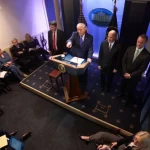

Congressional negotiators have struck a deal on appropriations for the Department of Homeland Security, the final component of the annual spending legislation that must be passed before the shutdown deadline later this week.
After days of lengthy negotiations and disagreements over border security policies, lawmakers have come to an agreement on how to allocate funds for DHS. Details of the deal are not yet clear, although legislative aides are aiming to get text finalized in the coming days, according to two sources familiar with talks.
The deal means Congress can move forward with its six-bill appropriations legislation to fund roughly 70% of the federal government. Funding for those government agencies is scheduled to lapse just after midnight on Friday, giving lawmakers only four working days to pass some sort of spending legislation through both chambers of Congress.
Negotiators initially planned to release legislative text for the spending legislation Sunday afternoon, but those plans were delayed over disagreements on how to allocate funding for the DHS for the remainder of the fiscal year. Those disagreements poured over into Monday afternoon when lawmakers failed to release any public update on the process.
Making things more complicated, a growing number of House Republicans have already come out in opposition to the spending deal, even before the legislative text has been finalized. The early opposition spells trouble for congressional leaders as they race against the clock to avoid a government shutdown.
It’s not yet clear how quickly the spending legislation can be pushed through Congress even once the legislation is complete. The House typically requires bill text to be available to lawmakers for 72 hours before it can be brought to the floor for a vote, which, if adhered to, means it wouldn’t reach the Senate until sometime Friday at the earliest.
The Senate could then take it up as quickly, or as slowly, as it would like. If even one senator objects, it could delay passage for days before the legislation is brought to the floor for a final vote.
CLICK HERE TO READ MORE FROM THE WASHINGTON EXAMINER
Leadership could skirt those rules, as former House Speaker Kevin McCarthy did last September to avoid the first government shutdown deadline. However, that decision helped lead to his eventual ouster.
The six appropriations bills set to expire on Friday include those to fund the Pentagon, State Department, Labor Department, Health and Human Services Department, DHS, and foreign operations. The remaining appropriations bills for fiscal 2024 have already been passed and signed into law by President Joe Biden.






